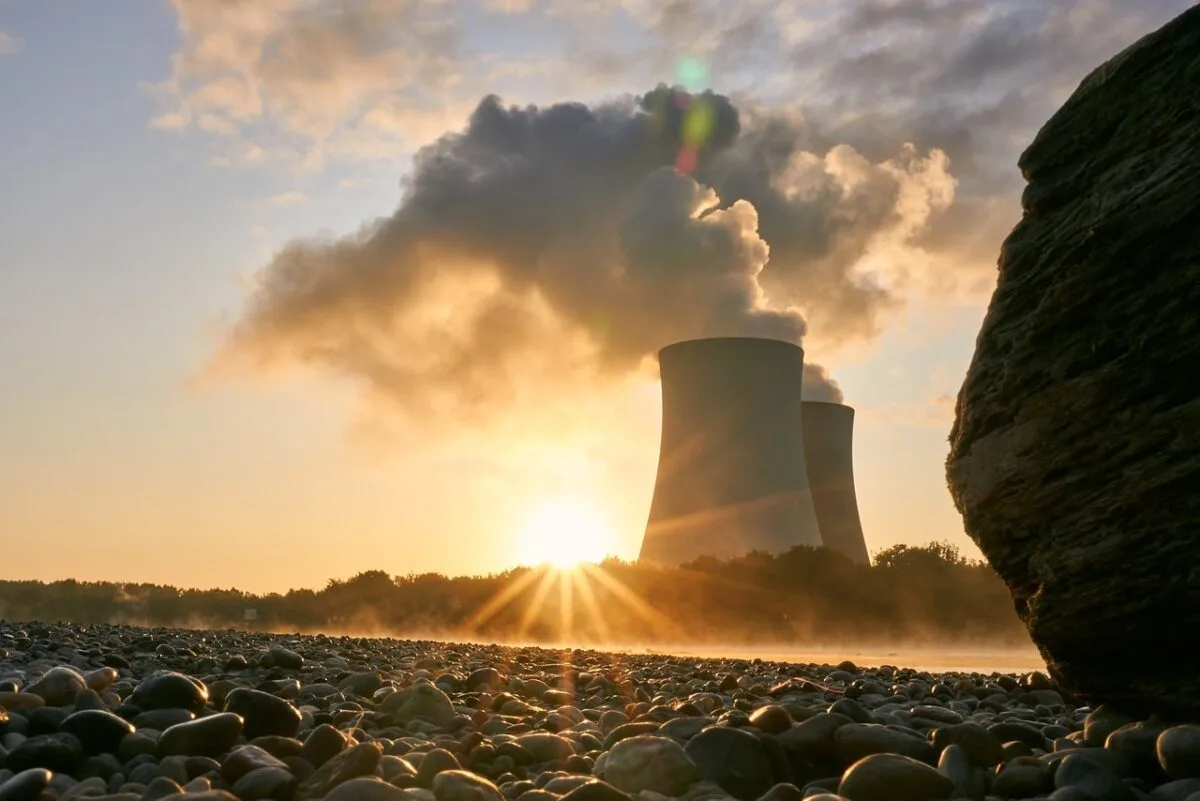- cross-posted to:
- energy@slrpnk.net

Yes, because profit is what’s so important and not part of creating the problem, right?
Why not use both?

Because we only have limited resources and they have to be used wisely. So if it is cheaper to build solar, rather then nuclear, we should use our workers to build solar. The other problem is that nuclear reactors do not last forever, so over time, they will be phased out, just due to economics.
No reason to fight the tide. Renewables and storage are enough.

People just say “storage” as if it’s some simple solution. It’s not. Pumped hydro can work in some places but it can also cause pretty impactful disturbances for the local ecosystem so it needs to be planned with care. Hydrogen storage is not a mature technology yet, it’s still in the trial stage and has pretty poor performance (something like 35% round-trip efficiency), not to mention the issues with hydrogen gas leaking due to its small molecular size. Shouldn’t even start discussing lithium ion, but the danger of thermal runaway should alone be enough of a reason to plan it very carefully.
Don’t get me wrong, renewables + storage is the future, aside from eventual fusion power it’s the cheapest and most environmentally friendly alternative. But a lot of people talk as if there aren’t enormous technical challenges in stabilizing a power grid with renewables at the moment. Remember that precisely all of the power that is put into the grid has to be pulled out of the grid, every minute of every hour of every day of the year, as soon as that equilibrium is broken in either direction we experience significant issues.

There’s so much years old anti storage propaganda in your text, it’s painful.
Hydrogen storage is not a mature technology yet
What makes a tech mature to you? We have all the components of a hydrogen storage path up and running everywhere around the world. They’re not profitable, at least not without government incentives, but solarpunk is anti-capitalist, so profitability shouldn’t be among our primary concerns.
something like 35% round-trip efficiency
That’s a worst case figure for purely electrical round trip efficiency. We could use waste heat of the fuel cell process (to a lesser extent also the electrolysis process) in order to bump that number up considerably.
not to mention the issues with hydrogen gas leaking due to its small molecular size
That has not been an issue for quite some time thanks to advances in materials science. Also, we could use methanation, of course sacrificing some more efficiency, but then we could even use old natural gas infrastructure without an issue.
Shouldn’t even start discussing lithium ion, but the danger of thermal runaway should alone be enough of a reason to plan it very carefully.
Lithium-ion batteries are environmentally bad for sure, but talking about thermal runaway? Really? You need very high temperatures for that to happen. Most stationary storage applications will never see such high powers that they come even close to thermal runaway by themselves. If in a high power application, you’ll have better battery management systems supervising the temperature and reducing the allowed power. It’s really a non-issue if you have engineers who know what they’re doing working on it.
Coming bad to environmentally bad: see sodium-ion batteries.

What makes a tech mature to you?
When significant issues have been worked out and it is, if not profitable, economically justifiable.
solarpunk is anti-capitalist, so profitability shouldn’t be among our primary concerns
I’m not primarily concerned with a Lemmy instance, I’m more focused on the world that we live in.
That’s a worst case figure for purely electrical round trip efficiency. We could use waste heat of the fuel cell process (to a lesser extent also the electrolysis process) in order to bump that number up considerably.
It’s a reasonable estimate, not a worst-case figure, and waste heat works well when additional heat is required and incredibly poorly when it is not. Heat storage is also an alternative but now we’re talking about requiring heat storage in order to make hydrogen viable, which bumps up the cost and reduces availability even further.
That has not been an issue for quite some time thanks to advances in materials science.
So this is not entirely true, leakage represents about 2.9-5.6% and hydrogen is an indirect greenhouse gas that can potentially have a 10 times bigger impact than CO2 over a 100-year period. Let’s not fix problems by potentially causing more problems.
Lithium-ion batteries are environmentally bad for sure, but talking about thermal runaway? Really? You need very high temperatures for that to happen.
All that you need is bad luck with dendrite formation and the battery can combust during regular cycling. An energy storage facility in Australia caught fire a few years ago. The ship off the coast of the Netherlands that burned just weeks ago was potentially caused by brand new EV batteries combusting. It is a significant concern.
It’s really a non-issue if you have engineers who know what they’re doing working on it.
I am an engineer.
Coming bad to environmentally bad: see sodium-ion batteries.
What do you mean by “Coming bad to environmentally bad”? I think sodium-ion batteries represent an exciting step forward in battery development since it would reduce the need for a material which is often environmentally disastrous to extract. There are also other storage mediums that are developing, Liquid- and Compressed Air Energy Storage, Flow Batteries, and Liquid Metal batteries to mention a few. There’s also the rust battery that’s under development by Form Energy. I don’t know why people get so hung up on hydrogen and lithium-ion batteries as if they’re the only two possible alternatives when at least one of them sacrifices safety and longevity for weight in a use-case where weight isn’t an issue.
I am interested in the tech, I’m trying to keep up to date with recent developments as it’s both interesting and in the same field as my degree, and I do think that it’s both inevitable that it will end up as the best alternative for the grid in the future and that there are exciting opportunities today. But we don’t have to ignore risks and cram other technologies into there just because fossil fuels are bad, we can phase them out and make right decisions for the future at the same time.

Not everywhere, not all the time. Were that the case we’d be much farther ahead in getting rid of fossil fuels.
For everywhere else we can count on power lines

That shows quite some misunderstanding of how power transmission works…
Also, there’s a very significant part of the world population living on islands. Even disregarding efficiency losses, do you want to crisscross the oceans with power lines?

Why not? We have plenty of cables and so forth down their anyway and they are hardly that bad. Besides efficency losses for hvdc are at 3.5% for 1000km. So you could transport electricity from any place to any other place on earth with max loss of 49% using that technology. You also do not need millions of power lines and mostly not across oceans, but connecting islands with the next continent. Even then most islands with high enough population for nuclear to be even be reasonable are both large themself or close to some other continent or large islands. As for costs there is a serious private venture to built a direct undersea power line from Morroco to the UK. It is not cheap, but it certainly is not crazy. Obviously we have an electricity grid in most places in the world already, with 87% of the worlds population having electricity and nearly all who have no access are in Africa.

Our government is busy to make people pay for owning solar panels. So yeah profit is always more important and literally no government or company gives a shit about the environment.
I’m pretty sure people will start removing their solar panels here soon since no one wants to pay more for doing good.

Renewables are incredibly cheaper to build, come online orders of magnitude faster, are completely non-centralized, require massively less infrastructure, have no millennium length waste storage dangers, etc etc etc. The only component still to be built out is energy storage to meet the baseload, and that’s well on its way with batteries, water pumping, and other energy storage technologies.
It’s just not even a question, renewables are the better choice for new construction.

Renewables are incredibly cheaper to build, come online orders of magnitude faster, are completely non-centralized
All true.
require massively less infrastructure
Not true. In fact, very much the opposite is true, nuclear plants are vastly more compact.
have no millennium length waste storage dangers
Neither does nuclear, really. Waste storage is a non-issue, that has had effectively zero observable impact over the decades we’ve been doing it.
But the bottom line is that this is a distraction. The longer we continue focusing on short term profit, repeating the previous generations’ mistakes, the harder it will be to get to zero emissions. Nuclear and renewables are not mutually exclusive. The more diverse our energy sources, the more robust our fossil-fuel free grid will be.

We need to do both. The amount of renewable energy that we need to decarbonize or economy is enormous.
Right now we don’t have the industrial capacity to manufacture the amount of solar panels, wind turbines and batteries needed for the transition. We need to ramp up the production, it means new factories, new trained engineers and technicians, new mines for the ore… All of that takes years or even decades to setup. The estimates I saw for the amount of lithium needed implied that we need to multiply the production by a factor of 20 !! Renewables energy also requires a lot of copper. New mines can take decades to open.
We already have some industrial capacity for building nuclear reactors do we should use it. Same for renewables and ramp up as much as we can.
I’m 2020 this is the world primary energy mix :
- Coal: 27.6%
- Oil: 31.6%
- Gas: 25%
- Nuclear: 4.4%
- Hydropower: 7%
- Wind: 2.6%
- Solar: 1.4%
- Other renewables: 0.5%
Right now fossil fuel are still above 80%, it needs to be close to 0% in 25 years. We need to use all the tools we have available: nuclear, solar and wind.

I agree, especially with respect to batteries. It’s not about nuclear vs renewables, it’s about nuclear vs batteries. We can probably scale up energy storage to meet the world’s baseload needs - but we haven’t done that before. It might take a long time, we might hit some dead ends, and it might not end up being as cheap as we hope. But we have seen nuclear power on a large scale so we know what it takes. To be certain we can get zero carbon as soon as possible we should pursue every promising avenue.
Also note that the cost of, for example, solar energy has decreased 94% in the last 35 years because we have (rightly) put lots of resources into research and scaling up production. Meanwhile nuclear investment has been way down for decades. Maybe the cost of nuclear would come down with economies of scale, and newer designs.

Energy storage is a really important piece of the puzzle that unfortunately gets often overlooked. We should be investing in it a lot more and try to find new solutions that don’t involve mining all the lithium in the world.

Is lithium still that important with the new battery technologies emerging?
I’ve been reading that sodium based and even solid state batteries are making leaps and bounds while at the same time we are actively reducing the amount of lithium required to manufacture large capacity batteries, by introducing new formulas based with much cheaper and plentiful elements.
What I would like to see is a ramp up on recycling more and better.

yes qyron
lithium remains a crucial element in the realm of emerging battery technologies, despite the evolution and diversification of battery chemistries. Lithium-ion batteries, which utilize lithium as a core component, have dominated the energy storage landscape for decades due to their high energy density, reliability, and widespread use in various applications, including consumer electronics, electric vehicles, and renewable energy storage.

@pizzaiolo Even with the extreme subsidies given to nuclear, it still doesn’t make money. Insurance payout cap, govt responsibility for cleanup, the fact most of the tech was paid for by public money, massive state and federal subsidies for plant operation… it still can’t turn a profit. lmao. That’s the real reason PGE was going to shut down Diablo. It’s too expensive to operate, and it has unfunded maintenance liabilities that total near the original plant construction cost.

…so?

For the article, which you apparently didn’t read:
“Given enough time, it may be possible to build a nuclear power plant to the highest safety standards and remain economically relevant, even taking into account the costs of storing nuclear waste for thousands of years,” the scientists concluded. “However, building nuclear power plants requires many years of planning and construction and is expensive, while the climate crisis demands urgency and requires such large investments that profitability is paramount.”

“However, building nuclear power plants requires many years of planning and construction and is expensive, while the climate crisis demands urgency and requires such large investments that profitability is paramount.”
…they say as they ignore the glaring fact that prioritising profit over everything else is literally what got us in to this urgency-demanding mess in the first place, and that depending on the “good will” of people who will refuse to act until and unless something is proven to make them money is only ever going to continue serving them, not the rest of the planet.
I think the person you replied to is valid in wondering why anyone thinks this is a positive development when all it is is more fucking around within the rules of capitalism and somehow expecting capitalism to change…

Pretty sure what he meant is that who cares about profit? Not a discussion we should be having when in a climate crisis brought about by chasing profits.
I say let’s decarbonise ASAP, while looking into a long term zero GHG emissions power grid. There is no one-size fits all when it comes to energy generation and distribution.

You can’t infest every house on every street on every neighborhood with door to door nuclear power plant salespeople. Profitability is the least important metric in my mind for such a huge topic as energy production.

Remember that, capitalization is important for people looking for those nice profits. And earnings come from differential capitalization. The issue was never that they are or not profitable, but if the ‘big capitalists’ are even willing to participate in making ‘abundance’ even a possibility.
I’m pretty sure that if we put our time and effort in organize ourselves we can handle most of the problem with power, but trying to get them to work in the “green capitalist” way is just not understanding how capitalism works. Its about control of production, not some ambiguous idea of a free-market with god-like awareness.
Hope these technologies develop faster, yet, I know if they are even implemented around the world with the idea to improve peoples lives: will not be under the state of capital.

New research has brought to light a significant shift in the energy landscape, indicating that renewable energy sources are now proving to be more profitable than nuclear power. This paradigm shift has far-reaching implications for the future of global energy production and sustainability efforts. The research underscores how advancements in technology, increased efficiency, and a rapidly evolving renewable energy sector are making wind, solar, and other clean energy sources not only environmentally responsible but also economically viable. This development not only reinforces the trend towards a greener and more sustainable energy future but also highlights the potential for substantial economic benefits associated with embracing renewables over traditional nuclear power options. As economies transition to cleaner energy alternatives, this research acts as a powerful catalyst for accelerating the adoption of renewable energy technologies on a global scale.

